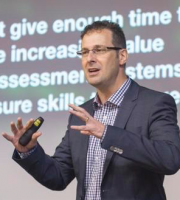In my enthusiasm to explain why teachers should be spending more time with their students working at the top of Bloom’s Taxonomy, I have often pointed out the fact that knowledge has falling value. I stand by that statement. Google is a pretty good knowledge prosthesis. A head full of knowledge is unlikely to get you a job any more. The skills that make a person valuable now are the so called “soft skills” – problem-solving skills, entrepreneurship, computational thinking skills, presentation skills, communication skills, an eye for design and leadership skills. Those skills are hard to automate and you can’t easily google them. In 2017 a head full of facts is only valuable at trivia nights. Oh! – and in exams.
But in my effort to point out that the value of knowledge is falling, I have sometimes been misunderstood to be saying that the importance of knowledge is falling. On the contrary. In many ways the importance of knowledge is rising!
Every year the Oxford Dictionary announces their word of the year; a word that has entered the public vocabulary in a profound way. In 2013, for example, the word of the year was “Selfie”. Can you guess what the word of the year was in 2016?
“Post-truth”.
“You can’t believe everything you read in the papers” is a saying that long predates the internet. But the saying is doubly true now. You definitely can’t believe everything you read on the internet. As the value of knowledge has fallen over the past two decades, it has taken trustworthiness down with it. That’s the downside of the internet giving everyone a voice. There are now lots of unedited voices being exercised.
A student without knowledge in a subject, has no filter through which to sift new information. In a post-truth world, knowledge is more important than ever – it’s just not what employers will be basing their hiring decisions on.

Couldn’t agree more!
It’s a tricky balance between having enough knowledge to be able to filter, and having enough understanding of how Google works to know how to interpret the results that appear for your inquiry.
An excellent post, Andrew. ‘Verifying facts’ is definitely a skill more fundamental than ‘finding information’.